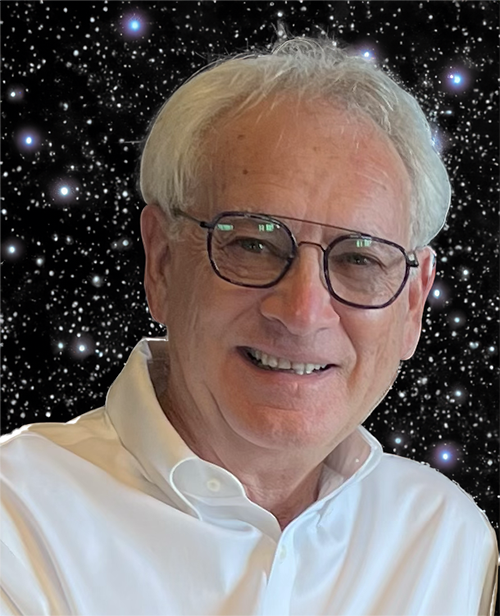[Editor’s Note: EDRM is proud to publish Ralph Losey’s advocacy and analysis. The opinions and positions are Ralph Losey’s copyrighted work.]
This article continues the Ai creativity series and examines current thinking among lawyers about their work and job security. Most believe their work is too creative to be replaced by machines. The lawyer opinions discussed here are derived from a survey by Wolters Kluwer and Above the Law: Generative AI in the Law: Where Could This All Be Headed? (7/03/2023). It seems that most other professionals, including doctors and top management in businesses, feel the same way. They think they are indispensable Picassos, too cool for school.
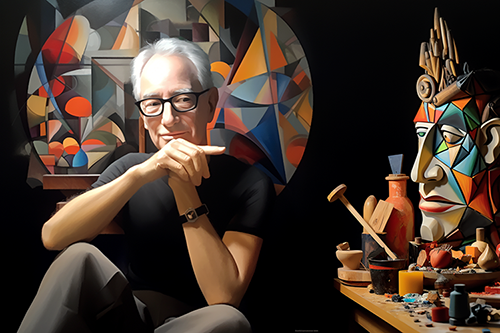
The evidence discussed on my blog in the last few articles suggests they are wrong. It might just be vainglory on their part. Creativity and How Anyone Can Adjust ChatGPT’s Creativity Settings To Limit Its Mistakes and Hallucinations; and Creativity Test of GPT’s Story Telling Ability Based on an Image Alone and especially ChatGPT-4 Scores in the Top One Percent of Standard Creativity Tests. Some of the highest paid, most secure attorneys today are very creative, but so too are the new Generative Ais. Some of the latest Ais are very personable too, dangerously so. Code of Ethics for “Empathetic” Generative AI.
Introduction to the Lawyer Survey
The well-prepared Above The Law Wolters Kluwer report of July 3, 2023, indicates that two-thirds of lawyers questioned do not think ChatGPT-4 is capable of creative legal analysis and writing. For that reason, they cling to the belief they are safe from Ai and can ignore it. They think their creativity and legal imagination makes them special, irreplaceable. The survey shows they believe that only the grunt workers of the law, the document and contract reviewers, and the like, will be displaced.
I used to think that too. A self-serving vanity perhaps? But, I must now accept the evidence. Even if your legal work does involve considerable creative thinking and legal imagination, it is not for that reason alone secure from AI replacement. There may be many other reasons that your current job is secure, or that you only have to tweak your work a little to make it secure. But, for most of us, it looks like we will have to change our ways and modify our roles, at least somewhat. We will have to take on new legal challenges that emerge from Ai. The best job security comes from continuous active learning.
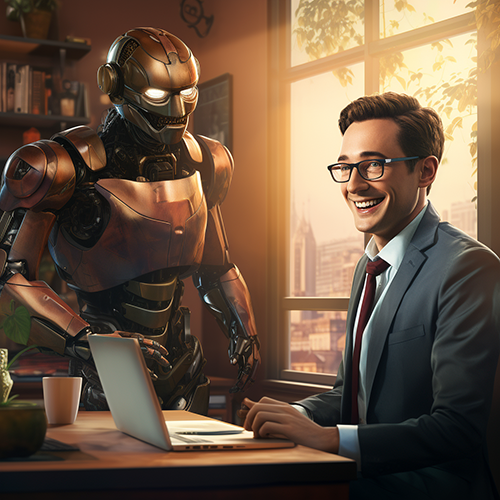
Recent “Above The Law” – Wolters Kluwer Survey
Surprisingly, I agree with most of the responses reported in the survey described in Generative AI in the Law: Where Could This All Be Headed? I will not go over these, and instead just recommend you read this interesting free report (registration required). My article will only address the one opinion that I am very skeptical about, namely whether or not high-level, creative legal work is likely to be transformed by AI in the next few years. A strong majority said no, that jobs based on creative legal analysis are safe.
Most of the respondents to the survey did not think that AI is even close to taking over high-level legal work, the experienced partner work that requires a good amount of imagination and creativity. Over two-thirds of those questioned considered such skilled legal work to be beyond a chatbot’s abilities.
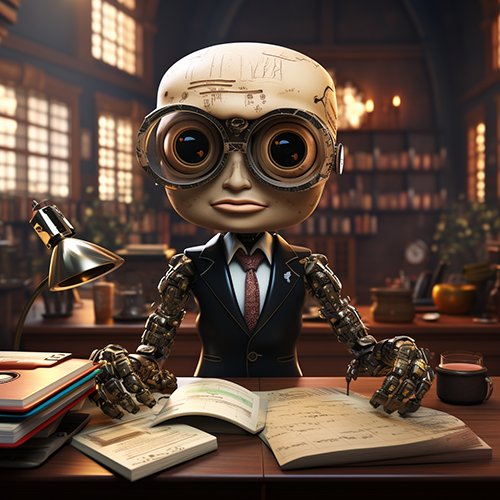
All images and video created by Ralph Losey and Midjourney
At page six of the report, after concluding that all non-creative legal work was at risk, the survey considered “high-level legal work.” A minority of respondents, only 31%, thought that AI would transform complex matters, like “negotiating mergers or developing litigation strategy.” Almost everyone thought AI lacked “legal imagination,” especially litigators, who “were the least likely to agree that generative AI will someday perform high-level work.” This is the apparent reasoning behind the conclusions as to whose jobs are at risk. As the ATL Wolters report observed:
The question is: Can an AI review a series of appellate opinions that dance around a subject but never reach it head on? Can the AI synthesize a legal theory from those adjacent points of law? In other words, does it have legal imagination? . . .
One survey respondent — a litigation partner — had a similar take: “AI may be increasingly sophisticated at calculation, but it is not replacing the human brain’s capacity for making connections that haven’t been made before or engaging in counterfactual analysis. . ..
The jobs of law firm partners are safest, according to respondents. After all, they’re the least likely group to consider themselves as possibly redundant. Corporate work is the area most likely to be affected by generative AI, according to almost half of respondents. Few respondents believe that AI will have a significant impact on practices involving healthcare, criminal law or investigations, environmental law, or energy law.
Generative AI in the Law: Where Could This All Be Headed? at pgs. 6,7.
Analysis
After having studied and used ChatGPT for hundreds of hours now, and after having been a partner in one law firm or another for what seems like hundreds of years, I reluctantly conclude that my fellow lawyers are mistaken on the creativity issue. Their response to this prompt appears to be a delusional hallucination, rather than insightful vision.

All images and video created by Ralph Losey and Midjourney
As Sam Altman has observed, and I agree, that it is an inherent tendency of the creative process to make mistakes and make stuff up, to hallucinate without even knowing it. Creativity and How Anyone Can Adjust ChatGPT’s Creativity Settings To Limit Its Mistakes and Hallucinations; (includes Sam Altman’s understanding of human “creativity” and how Ai creativity is somewhat similar), Creativity Test of GPT’s Story Telling Ability Based on an Image Alone (you be the judge, but ChatGPT’s stories seem just as good as that of most trial lawyers) and ChatGPT-4 Scores in the Top One Percent of Standard Creativity Tests (how many senior partners would score that high?). Also see: What is the Difference Between Human Intelligence and Machine Intelligence? (not much difference, and Ai is getting smarter fast).
The assumed safety of the higher echelons of the law shown in the survey is a common belief. But, like many common beliefs of the past, such as the sun and planets revolving around the Earth, the opinion may just be a vain delusion, a hallucination. It is based on the belief that humans in general, and these attorneys in particular, have unique and superior creativity. Yet, careful study shows that creativity is not a unique human skill at all. Ai seems very capable of creativity in all areas. That was shown by standardized TCTT creative testing scores in a report released the same day as the ATL Wolters Survey. ChatGPT-4 scored in the top 1% of standardized creativity testing.
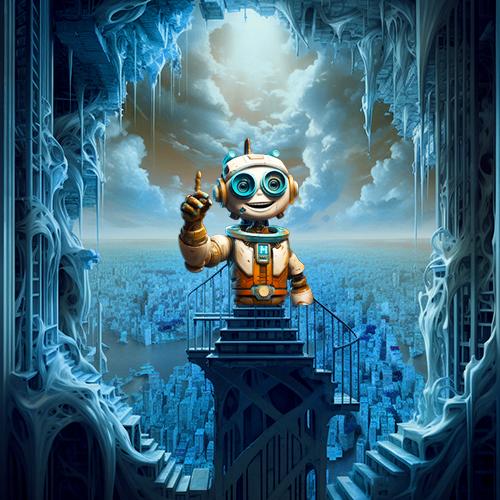
Also, consider how human creative skills are not as easy to control as generative Ai creativity. As previously shown here, GPT-4’s creativity can be precisely controlled by skilled manipulation of the Temperature and Top_P parameters. Creativity and How Anyone Can Adjust ChatGPT’s Creativity Settings. How many law firm partners can precisely lower and raise their creative imagination like that? (Having drinks does not count!) Imagine what a GPT-5 level tool will be able to do in a few years (or months)? The creativity skills of Ai may soon be superior to our own.
Conclusion
The ATL and Wolters Kluwer survey not only reveals an opinion (more like a hope) that creative legal work is safe, it shows most lawyers believe that legal work with little creativity will soon be replaced by Ai. That includes the unfairly maligned and often unappreciated document review attorneys. It also includes many other attorneys who review and prepare contracts. They may well be the first lawyers to face Ai layoffs.
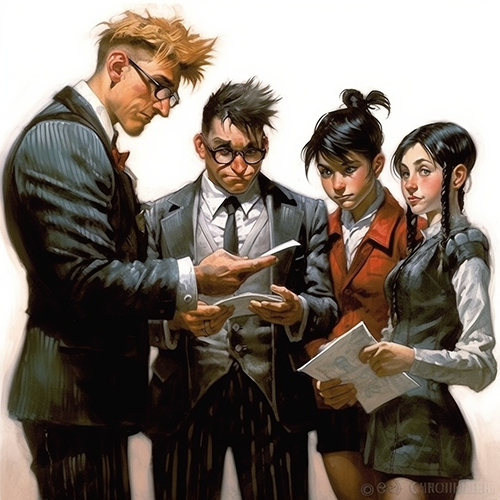
All images and video created by Ralph Losey and Midjourney
Free training and economic aid should be provided for these attorneys and others. McKinsey Predicts Generative AI Will Create More Employment and Add 4.4 Trillion Dollars to the Economy (recommending economic aid and training). Although the government should help with this aid, it should primarily come from private coffers, especially from the companies and law firms that have profited so handsomely from their earstwhile work. They should contribute financial aid and free training.
EDRM provides relevant free training and you should hook-up with EDRM today. Also, remember the free online training programs in e-discovery and Ai enhanced document review started on the e-Discovery Team blog years ago. They are still alive and well, and still free, although they are based on predictive coding and not the latest generative Ai released in November 2022.
- e-Discovery Team Training. Eighty-five online law school proven classes. Started at UF in 2010. Covers the basics of e-discovery law, technology and ethics.
- TAR Course. Eighteen online classes providing advanced training on Technology Assisted Review. Started in 2017, this course is updated and shown as a tab on the upper right corner of the e-Discovery Team blog. Below is a short YouTube that describes the TAR Course. The latest generative Ai was used by Ralph to create it.
The e-Discovery Team blog also provides the largest collection of articles on artificial intelligence from a practicing tech-lawyer’s perspective. So far in 2023, thirty-seven articles on artificial intelligence have been written, illustrated and published. It is now the primary focus of Ralph Losey’s research, writing and educational efforts. Hopefully many others will follow the lead of EDRM and the e-Discovery Team blog and provide free legal training in next generation, legal Ai based skills. Everyone agrees this trend will accelerate.
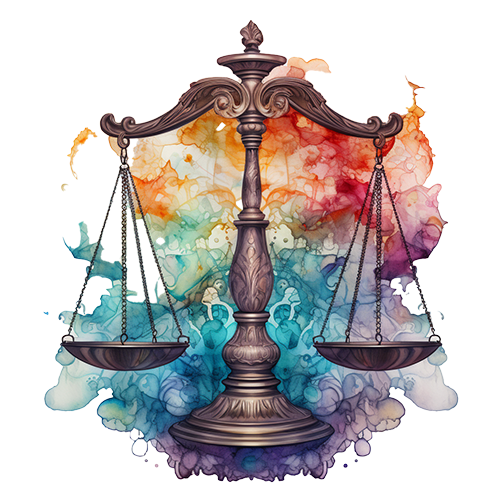
All images and video created by Ralph Losey and Midjourney
Get ready for tomorrow. Start training today, not only by the mentioned courses, but by playing with ChatGPT. It’s free, most versions, and its everywhere. For instance, there is a ChatGPT bot on the e-Discovery Team website (bottom right). Ask it some questions about the content of this blog, or about anything. Better yet, go sign up for a free account with OpenAI. They recently dropped all charges for the no-frills 4.0 version. Try to learn all that you can about Ai. ChatGPT can tutor you.
There is a bright future awaiting all legal professionals who can learn, adapt and change. We humans are very good at that, as we have shown time and again throughout history. We will evolve, and not only survive, we will prosper as never before. Sam Altman’s Favorite Unasked Question: What Will We Do in the Future After AI?
This positive vision for the future of Law, for the future of all humanity, is suggested by the below video. It illustrates a bright future of human lawyers and their Ai bots, who, despite appearances, are tools not creatures. They are happily working together. The video was created using the Ai tools GPT-4 and Midjourney. The creativity of these tools both shaped and helped express the idea. In other words, the creative capacities of the Ai guided and improved the human creative process. It was a synergistic team effort. This same hybrid team approach also works with legal creativity, indeed with all creativity. We have seen this many times before as our technology advances exponentially. The main difference is that the Ai tools are much more powerful and the change greater than anything seen before. That’s why the lawyers shown here are happy working with the bots, rather then in competition with them.
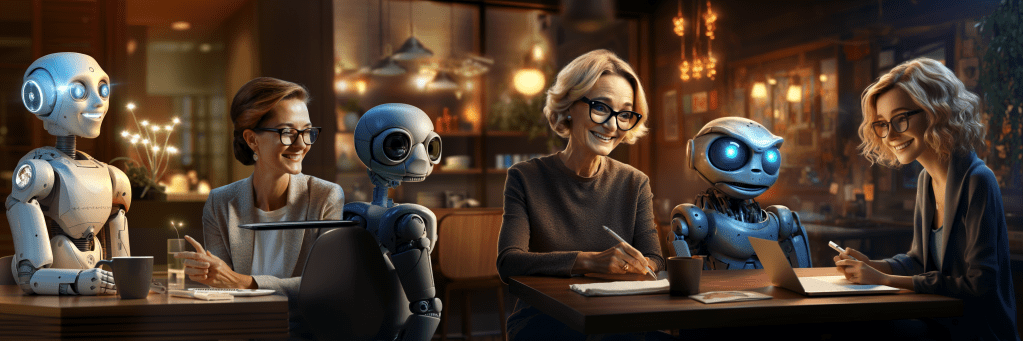
Ralph Losey Copyright 2023 – ALL RIGHTS RESERVED — (Published on edrm.net and jdsupra.com with permission.)
Assisted by GAI and LLM Technologies per EDRM GAI and LLM Policy.


